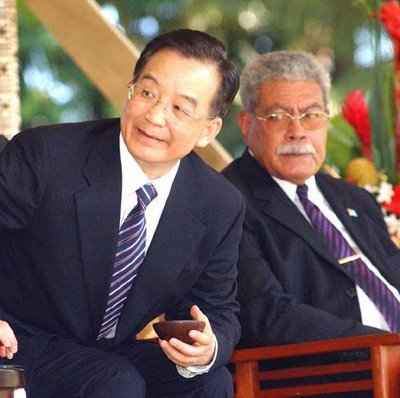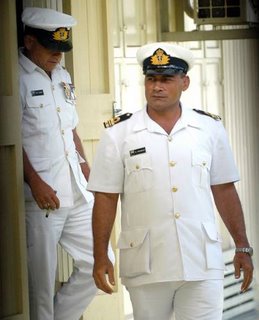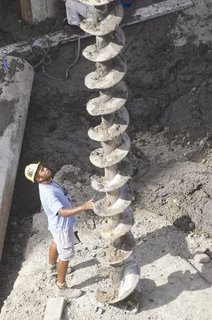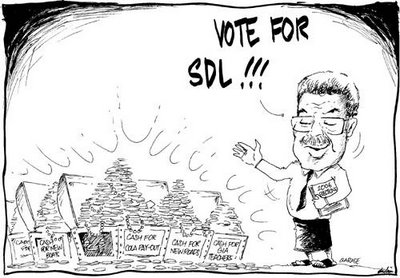Ethos is defined as the process of establishing credibility among the audience. Logos is the method of reasoning which a speaker applies in getting his point across. Pathos is the manner in which the speaker uses emotional appeal.
The application of these qualities is considered a highly rated skill in speech writing. As speech writing is synonymous politics. The skill has been actively applied in Fiji politics with varying results.
Fiji is full swing into the political campaign season. The party voting preference has been finalized, as candidates polish and tweak the manifestos to perfection. Fiji elections are incomplete without controversy. It is also the reason for overseas election observers, who are tasked in grading the entire election process with international voting standards.
Standing Prime Minister and S.D.L party leader, Laisenia Qarase salvo of back lashes from the competing political parties in Fiji. This is a following recent statements in the Fiji media, commenting on the future political scenario based on ethnic population projections.
Other parties like the United People Party is keeping their candidate’s media profile on a tight noose, to prevent candidates from wandering into the slippery slope of campaign mud-slinging.
U.P.P’s policy, is an example of Ethos.
The calls for provincial councils in Fiji, to become apolitical by the current chairman of Ba Provincial Holdings Chairman, who is also contesting the Lautoka City Open seat, is an example of Logos. The comments, is also a wonderful example of a political hypocrite, using the rationale of legal control. Since Ba Provincial Holdings is an entity of Ba Province, the Chairman is also a representative of the province, thus destroying his own credibility. This is an example of flawed Ethos.
More example of tarnished credibility is the case of S.D.L’s learned candidate, Dr Tupeni Baba. Once a staunch Labour politician who has abandoned the very party and ideology that he co-founded.
NFP has lost wisdom, says Dr Baba
The National Federation Party has been accused of being selfish when it gave its first preference to the Fiji Labour Party instead of the Soqosoqo ni Duavata ni
Lewenivanua. SDL candidate Dr Tupeni Baba said he was shocked to learn the NFP had refused to return to discuss the sharing of its preference with the SDL.“It
is an act of betrayal after we expressed out willingness to work with the NFP,” said Dr Baba. He said NFP officials did not share the same principles of the party’s founding fathers, who had done a lot for the country. He cited the establishment of the Fiji National Provident Fund as one of the fine examples of NFP’s initiative during its time in Parliament.“The present members of the NFP lack wisdom,” said Dr Baba. He said Labour leader Mahendra Chaudhry had offered some Senate seats to the NFP and that was why they did not return to complete their discussions with the SDL. He said the NFP had given all its important preferences to the National Alliance Party and the Fiji Labour Party. “All those political parties are trying to topple the ruling SDL government,” Dr Baba said, adding that all those open seats “are important to the SDL for it to win the election”.
NAP lashes out at Baba’s criticism
The National Alliance Party has described Doctor Tupeni Baba's criticism on the party as immature and irresponsible. Campaign director Joe Gucake said Doctor Baba’s comment that a vote for NAP was a vote for Fiji Labour Party’s Mahendra Chaudhry was uncalled for.“It is immature and irresponsible, especially coming from a former deputy prime minister and a strong advocate for multiracial issues when he stood for the Labour party,” he said. “Now he has chosen to go on another road and has changed his tune. This is uncalled for a man of his standing because he should be a good example for people that they support multiracialism.”
Mr Gucake said that it was unfair because that principle was under the support of the founding fathers of the country. “If there is anything that he should talk on, it should be on issues that will help Fiji’s economic growth and development.” And, he said, Dr Baba’s tactics were “cheap and unfair” to the voters. “He is just trying to put more salt in the wound and trying to justify the differences between him and Chaudhry. What he should do is campaign more,” said Mr Gucake. (Fiji Sun)
The following is an excerpt of S.D.L parlimentry leader, Laisenia Qarase's speech in launching their 2006 manifesto; which will be analysed according to the precepts of Ethos, Logos and Pathos. N.B. Color coding of the speech will identify the verbatim of appeals.
Hon Laisenia Qarase's speech at Launch of SDL 2006 Manifesto
Saturday, 18th March,
2006Ladies and Gentlemen, supporters and friends of the SDL,
Today, the SDL Party begins its crusade for re-election. Today, we give you our Manifesto for the future. We call the nation to rally with us under a new banner and a new battle cry – Beat Poverty! Raise Prosperity! Those words go to the heart of what we want to do, not only during the next five years, but for the next generation.
Give us your support and we will step up the war against poverty and create more wealth for the people of Fiji. We will redouble our efforts to make more jobs and career opportunities and improve incomes.
Our country has marched far from what happened in 2000. We have risen, regathered our strength and advanced. The world has seen what we have achieved; many international leaders and organisations have praised our recovery from disaster. Yes, much has been done, but there is much still to do.The SDL has numerous plans and ideas to take Fiji into the most exciting period of development in our history.Give us your support, and together, we will make Fiji all it can be.We will make life better for all our citizens, especially those in need. We will beat poverty and raise prosperity! Getting a job, and employment, earning decent money - these
are the issues that concern people the most. That was confirmed the other day by
an opinion poll. We did not need a poll to tell us this. That is why the Manifesto launched here gives the highest importance to creation of employment, and to helping people out of the poverty that comes when you are out of work.
Please read our Manifesto, and you will see what we intend to do. It is a fact that many thousands of jobs have been made under the leadership of our Government. This has not happened by chance.It is a result of the efforts we put into rebuilding the economy and business confidence. It is this confidence that produces investment, and it is investment that creates jobs.The Labour Party scared investors with its negative attitude. The SDL welcomed and encouraged them, and they responded as never before. Many new projects were started, particularly in tourism and construction, and in other parts of the
economy.A record number of people now have regular employment. Wages and salaries have increased.But it is not enough. We are pushing for more and more investment to give us more and more jobs. We will make the economy stronger so that personal earnings continue to rise. To the unemployed I say: Stay with us.
The SDL can do this. It will do it for you and your families.We have proved ourselves in rescuing Fiji and opening the way for a lot of people to join the workforce. Put your trust in us again and we will continue to boost the
investment that produces employment.
We will not rest until the poor and needy have higher living standards and no longer have to worry about putting food on the table. In the urban centres, squatters will be given new hope through increased funding for resettlement. We will spend at least $5 million a year to assist about 1000 families annually.They will move into their own homes, served by proper roads, water and electricity. Our total programme of low-cost housing will target the financing of 3000 homes every year, in different parts of the country. The financial support we gave to the Housing Authority made it possible for the Authority to drop its borrowing rate. It is now the cheapest on the market. This creates significant savings for working people who want to borrow, to build or buy, their family homes. This is what we want, more people owning their own homes.
Minimum social welfare allowances for destitutes are to be doubled – from $30 to $60 a month. This will benefit over 16,000 people presently receiving the minimum payment. Twice in the last five years, we have increased the take-home pay of many workers by freeing them from income tax.
We will bring this benefit to more wage earners when we are returned to office. A
new SDL Government will improve workers’ compensation and give working women better conditions of employment. There are plans for better sick and bereavement pay for all workers.We have schemes for new health insurance for the common people and will look at pensions for those presently without retirement benefits. We have made a start in assisting the elderly with cheaper bus fares. We intend to take this further and make travel on public transport for senior citizens completely free. War veterans and ex-servicemen used to be one of Fiji’s forgotten and unsung heroes. They are forgotten no more. Our Government increased their allowances by 25 percent. We plan to lift these further and add to their benefits by also arranging free public transport for them, and additional medical and housing assistance.
Peacekeepers serving overseas have received increased field allowances. We will consider further improvements to these. The SDL is very concerned about the welfare of our minority communities, particularly our Melanesian and Vasu-i-Taukei citizens.We want to make sure that in a multi-racial community their interests are properly looked after and they share fully in development. We are, therefore, considering a special trust fund account, to be used especially for social and economic projects for the minority communities. All these things, and more, are central to our plans for helping people in their daily lives. They will add to the benefits and cost reductions we introduced in our first term of office.
These ranged from removal of Value Added Tax on basic consumer items, to scrapping of hospital charges, removal of all education tuition fees and external examination charges, and a drop in telephone costs. Can we do what we promise? Of course we can.
We kept a large number of the pledges in our first Manifesto. We will strive to deliver what is in the new Manifesto launched today. If I come back as Prime Minister, the Manifesto will be my constant guide. I will personally track our progress in putting it into effect, just as I did with the SDL’s first Manifesto. In the rural areas, where the poorest live, there will be big investments to lift incomes, employment and services.
We have started to make a difference for rural communities to make up for earlier years of neglect. It is the start of a quiet revolution. The task is enormous but the first steps have been taken.I also have a message today to the growing numbers of those who have worked hard to educate themselves, and are doing well professionally.
We will give you the stability you need to protect your earnings, your assets and
homes that have increased in value since the SDL has been in Government.
Stability and certainty are essential for our orderly development and progress.
The SDL has demonstrated that it can deliver stable government, with a consistent set of plans for growth now and in the future. This is not the time
for trying out political parties and coalitions thrown together just to gang up
on the SDL. Many of their candidates are yesterday’s people who failed in past elections. Let me tell you, yesterday’s people do not have the answers for tomorrow. They live in the past. We are about the future.Ladies and gentlemen, and supporters, we share with you a belief that education is key to progress. Our spending on this is higher than that of any Government before us. We will concentrate harder on achieving a better and cheaper education for all children, regardless of race, religion, and culture.
The biggest support we gave to parents in education during our first term, was to extend the tuition fee assistance scheme right up to Form Seven. This means more than 220,000 children at primary and secondary schools now do not have to pay tuition fees. We also freed more than 70,000 students from paying annual external examination fees. Put us back into office and we will do more.
Education is never completely free in any country. There is always a cost. But the SDL is committed to doing as much as it can to help parents with the cost of educating their children.
We know, for instance, about the expense of school text books. We will look closely at whether we can ease this. Similarly, school bus fares are a big expense for poor people and working families.
We have given support for bus companies to help in holding down fares. A re-elected SDL will give close consideration to cutting school bus fares.When we asked for your support in 2001, we said one of our main aims was to assist each family have at least one child attain university or other higher education qualifications.
We are moving towards this goal. In the last five years we have financed more than 12,000 scholarships. Six thousand of these were for Fijian and Rotuman students. Six thousand were for students from our Indian and other minority communities. This form of assistance will continue when we come back to office.There will be on-going affirmative action for disadvantaged groups from each of our ethnic communities, as provided for in the Constitution. This special help includes scholarships and student loans, training, family assistance, help for small business and agricultural schemes, accommodation for the needy, and more.
Our opponents like to say that affirmative action is just for the Fijians. That is a straight out lie. It covers those in need whether they are Fijians, Indians, or people of other races. Programmes for the Fijians recognise that they are behind in
education, the professions, and business, and have, on average, the lowest levels of household incomes. It is important for stability and unity to make special efforts to bring the Fijians to equality with other groups.We often read in the media that the Government discriminates against non-Fijians in affirmative action for education. That is nonsense. Although more funds are being invested, of necessity, in Fijian education, non-Fijian schools still receive,
by far, the largest part of Government’s financial assistance for education. The
Opposition parties are claiming that ordinary people do not get anything from
affirmative action. They are saying that to get votes.The truth is that poor and
low-income earners are the main receivers of this aid. It took the SDL Government to make this happen. Our new Government will conduct a complete review of all our affirmative action programmes in close consultation with the Fiji Human Rights Commission. We want to be absolutely sure that what we are doing is in full agreement with the Constitution. We also want to ensure no deserving or needy group is excluded from affirmative action assistance. It has always been our objective for all development and assistance schemes to extend to everyone, irrespective of race and gender.We want development to benefit all citizens in every part of Fiji.
Ladies and gentlemen, the short version of our Manifesto distributed here, is packed with information about our intentions for a renewed period in Government. I cannot touch on everything. But please bear with me while I briefly mention two issues vital for Fiji’s prosperity.The first is land. The SDL developed a very good plan for solving the land lease
issue. There was to be more rental income for the indigenous landowners, and
secure 50-year renewable leases for the farmer tenants. Our proposals were fully
supported by the Native Land Trust Board and the Great Council of Chiefs.I tell you, in all sincerity, this was the best and fairest solution ever put forward
for a problem that has haunted us for a long time. It is a problem that has
turned thousands of farming families into urban squatters, living in shacks
without proper amenities. Their needs were rejected by the Fiji Labour Party,
and the United Peoples Party when they refused to support in Parliament the
SDL’s just and fair proposals. Without their backing, our proposals could not go
through.These two parties also ignored the plight of the poorest of the poor in
rural areas. We gave those people hope for a secure future on the land. That
hope was smashed by Labour and the United Peoples Party. In fact the Labour
Party has encouraged former tenants to leave their farms and reject the Government’s land resettlement assistance. Labour preferred to see them move to urban centres where they have been forced to live as squatters.As if that was not enough, Labour and the United Peoples Party also condemned the landowners to continuation of rental incomes that are among the lowest in the world. Remember this when you go to the polls. Support the SDL, the party that had the will and the vision to do the right thing on land. What happened was a setback for the nation. But we are going to press forward with a fresh approach, one that fully safeguards the interests of indigenous landowners and the farmers, while encouraging economic development.
As soon as we have finalised details of our thinking, we will consult with the landowners, the Native Land Trust Board, the Great Council of Chiefs, farmers and the public at large.
The SDL Coalition is moving ahead with a project to save the sugar industry which provides a livelihood for many thousands of people. The industry has been in decline for many years and can no longer compete on the world market. It is only surviving at present because of Government support. Our plan, with the assistance of India, will make a new-look industry with higher milling and farming standards, improved incomes, and additional crops.
But the Fiji Labour Party, in yet another example of its negative attitudes, is refusing to co-operate in the reorganisation of the industry. What a sad thing that is from a party that receives support from cane farmers.
Ladies and gentlemen, the SDL is strong, united and confident. We have a very positive attitude to Fiji. We are a great country with talented people. Let us accomplish everything we are capable of, through the power of our talents, our energy, and our ambition.
At this critical time in our history, Fiji needs to stay firmly on course, in the safe and caring hands of a Government with a positive outlook, and a clear vision. This election is about many things. One of these is obviously votes. That is how democracy works. We must try, however, to look beyond the votes, to the vision the SDL offers of a peaceful, prosperous and harmonious Fiji.
We will continue to urge citizens to reach out to each other and overcome their differences. We will seek unity based on a mutual loyalty to a homeland where rights, freedoms, equality, and the rule of law are assured. I hope this election will pave the way for a multiracial Government. As I have said on many occasions, a workable multiracial Cabinet is one where political parties willingly come together through shared ideals, and a positive approach to nation building.
We ask you to place your trust in us once again, so that we can continue our journey together to a future of hope and happiness. Join with me; join with the SDL in beating poverty, and raising prosperity! Vote for the SDL’s dove of peace and inspiration.
May God bless you and your families, and may God bless Fiji.
Thank you very much. Vinaka vaka levu. Bahut dhanyawaad.
Club Em Designs








 Back to Fiji current affairs.
Back to Fiji current affairs. The Army's Truth Campaign continues
The Army's Truth Campaign continues 





